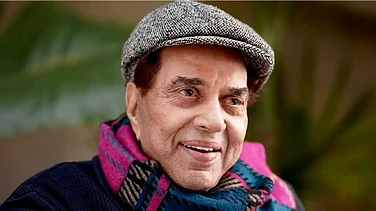Something snaps inside you after you finish watching Daughters of Destiny. The docuseries on Netflix then triggers an endless chain of thoughts and leaves you with several questions that go unanswered—especially if you are a woman, and especially if you are one born in a patriarchal system in India.
But that an American woman should direct a documentary like this to trace the lives of five girls from the most backward communities from the region around Tamil Nadu, comes as a surprise. The title is as thought-provoking as its chief protagonists, whose disturbing real lives are thrown open to the viewer in striking contrast to the lives that they are going to be prepared for.
Directed, produced and created by Vanessa Roth, the daughter of Academy Award-winning screenwriter Eric Roth, Daughters of Destiny is a four-part documentary that starts at Shanti Bhavan, a residential school on the outskirts of Bengaluru. At the helm are Shilpa, Manjula, Preetha, Karthika and Thenmozhi —all from extremely poor, backward and low caste (Dalits) backgrounds and communities. The film tracks their story, life and its trajectory through a gradual process spanning seven years.
What piques interest is the fact that it takes you along on this fascinating journey of young girls, their dreams, aspirations and their mission through the lens that not for a minute deviates from the natural progression of thought and narrative. It deftly captures every nuance, every expression, every detail of the face and the tone and voice, so as to keep you glued to what is yet to unfold. And it is these five girls who take the narrative forward with dialogue, voiceover and video diaries and interviews that at no point appear jarring or boring. And therein lies the beauty of this documentary that could have, with a bit of deviation here or there, sounded more like a sermon on social change.
“I was born in a land where fate is usually conceived as a woman”—the opening line in Shilpa’s voiceover is so beautifully and softly spoken that the gravity of it hits you much later. She goes on to speak of how Mother Fate inscribes the destiny of each child on his/her forehead at the time of birth. In Kannada language, the phrase for it is ‘haneli barediddu’, which means ‘what is written on the forehead’.
It is from here that we are taken into the sprawling acres of Shanti Bhavan and introduced to its founder Dr Abraham George who talks about building “future leaders for the society” and teaching them to contribute to “the larger world”. Taken in at age four, the school grooms each child for a period of 14 years, taking care of every need right until three more years of college.
The premise that the school works on for “the poorest of the poor” is simple—children ought to get good grades, pass out with flying colours, get into the best of colleges, graduate and get jobs and then work towards helping more socially backward children; at least a 100, reiterates the founder through the film. That comes across as a bit of too much pressure. And Preetha is vocal about the fact that there is school control and she cannot take up singing (which is her passion) simply because Dr George expects her to take up a job that makes good money so she can fulfil their aim of further helping the community.
And so, even as we move into the extremely small, cluttered, dark and dingy shanty-like homes of all these girls and come face-to-face with their plight and poverty, their confined lives open up into the vastness of Shanti Bhavan and its open, free and lively atmosphere. And therein lies their dilemma.
Each of these girls, even the youngest Thenmozhi, cannot come to terms with this dual existence and she, time and again with a childlike innocence and simplicity, says, “I don’t like to go home”, though she acknowledges missing her mother. And each time the girls talk about family and community, the mother is the focal point. It is to relieve her of all her burdens, troubles and pains that these ‘daughters of destiny’ wish to break the shackles of poverty and wretched existence and move her into a life of happiness and relief. Were not the mothers too, the daughters of destiny? That appears to be the underlying theme that Roth very effortlessly touches upon.
We see the camera capture the girls through their school days, in class, playground, through extra-curricular activities, dining, and even chit-chatting, laughing, dancing and having fun. Speaking in impeccable English throughout, Thenmozhi is adorable as she admits her mistakes and problems; Shilpa comes across as extremely articulate; Karthika is the determined and focused one and believes that “every alternative has a cost” and some sacrifices must be made; Manjula is the silent crusader type and Preetha is the defiant lively butterfly who hates being controlled and loves to write poetry and sing.
The emotions of each are captured with close-ups of their faces and each time this happens, you realise how real the situations, people and their circumstances are. You get so involved in the lives of these girls that you look forward to where the film would eventually take you as the episodes progress.
From school to college, the girls find themselves in a different world so disparate that Shilpa finds it difficult to even cross the road. Literally! Preetha is suddenly enamoured by college life but faces too many restrictions from home and society and feels stifled. “Being a girl in India is tough”, she says. Karthika’s mother has worked in a stone quarry all her life and so this daughter has had it in her to study law as it would be “a very important tool in empowering my community”. Manjula joins a nursing course and feels that there would be no better way to serve society than being a nurse.
The music by AR Rahman and Qutub-e-Kripa (a national award-winning ensemble of young musicians of Rahman’s KM Music Conservatory) is so in the background, merging with it in a way as to never overpower the narrative or disturb the story. Almost inconspicuous, the music nevertheless strikes the right chords at just the right places. And therein lies its beauty.
The storyline flows smoothly and Roth is able to deliver an interesting take on the lives of real women and avoid what could have easily become a sermonised documentary. As the girls share their concerns, vulnerabilities, desires and passions, the problems faced by the school are also clearly voiced. In that, the film does not cross over to being prejudiced.
The last episode does have Dr George getting into a preaching mode with his pressure tactics where he says that if these girls aspire for a better life for themselves, then he would have failed in his mission. You give them education, freedom to voice their opinions, and empower them to, in turn, empower communities and society, and tell them to not dream for themselves? That comes as a contradiction. They were born in a certain life and you give them a completely different one and then try to control them. Don’t the ‘daughters of destiny’ then remain just that? Only the one who governs their destiny is a man and not a circumstance. And so children of construction workers and rag pickers still have an apprehension if they have left their poverty-stricken lives far behind or “if my karma might still undo me”?
By the time the documentary ends, Thenmozhi is a teenager, Manjula a nurse, Karthika a lawyer with a corporate job in Delhi (she featured in the CNN-IBN Zindagi Live Awards), Shilpa is training to be a journalist and Preetha still hasn’t found what she wants to do. But with hope and dreams in their eyes, each gives us a reason to smile and believe in what destiny might now have in store for these daughters.
(Views expressed are personal)
Deepa Gupta is a journalist, writer and documentary scriptwriter




















